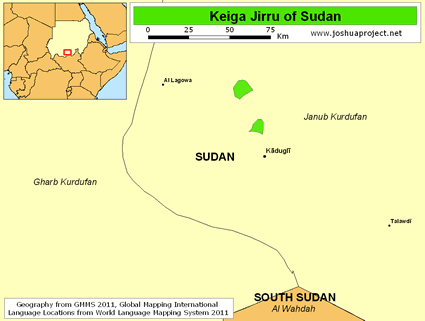The Keiga Jirru people, an ethnic group in the Nuba Mountains of Sudan, have lived in this region for generations. Their history reflects a deep connection to the rugged terrain of the mountains, which has shaped their way of life and their strategies for survival. Over time, the Keiga Jirru have developed a distinct cultural identity, maintaining their language, customs and traditions despite external pressures from conflicts and changes in Sudanese society. Their resilience has enabled them to navigate the challenges posed by regional conflicts and environmental hardships.
The Keiga Jirru live a predominantly agrarian lifestyle. They cultivate crops such as sorghum, millet and sesame, which are essential to their diet and economy. The mountainous terrain, while challenging, provides fertile land for farming. The Keiga Jirru also raise livestock, including goats and cattle, which are integral to their livelihoods and social structures.
Community life among the Keiga Jirru centers around extended family units, with strong communal ties. They work together to cultivate the land, build homes and support one another. Despite the isolation of their mountainous environment, the Keiga Jirru maintain a vibrant social life, characterized by frequent gatherings and communal activities. However, they face challenges related to access to clean water, healthcare and education, which are limited due to the remote location of their villages.
The Keiga Jirru people's belief system is a complex blend of traditional animist practices and Islam. They traditionally worship spirits associated with the natural world, believing that these spirits have a direct influence on their lives and the environment. Rituals and ceremonies, often involving music, dance and offerings play a central role in their spiritual life.
In recent years, the influence of Islam has grown among the Keiga Jirru, leading to a syncretic religious practice that incorporates both Islamic and traditional elements. Islamic practices such as daily prayers and fasting are observed, while traditional beliefs continue to hold significant importance. Religious leaders, both traditional and Islamic, guide the community in spiritual matters and help mediate conflicts.
The Keiga Jirru people face significant challenges, particularly in the areas of healthcare, education and economic development. Access to healthcare is limited, leading to high rates of preventable diseases and maternal and child mortality. Educational opportunities are scarce, with many children unable to attend school due to a lack of facilities and teachers.
Economically, the Keiga Jirru would benefit from initiatives that improve agricultural productivity and resilience. Access to markets, improved farming techniques and resources for livestock management are critical to their economic sustainability. Infrastructure development, such as roads and clean water access, is also essential to improving their quality of life and ensuring a sustainable future for the community.
Pray for Keiga Jirru culture to be renewed and enhanced by a work of the Holy Spirit and shaped into a God-centered and God-honoring mold.
Pray for the Holy Spirit to move among Keiga Jirru family and community leaders to seek his face and enjoy his blessings.
Pray for the Lord to thrust out workers who will be compelled to nurture a movement to Christ among the Keiga Jirru people.
Pray that soon the Keiga Jirru people will have faith that will lead them to live honorable lives that will draw others to the savior.
Scripture Prayers for the Keiga Jirru in Sudan.
Stevenson, R. C. (1984). The Nuba People of Kordofan. Oxford University Press.
Salih, M. A. (1999). Agricultural Change in the Nuba Mountains: Sudan's Forgotten War. James Currey Publishers.
Beswick, S. (2004). Sudan's Blood Memory: The Legacy o
| Profile Source: Joshua Project |











